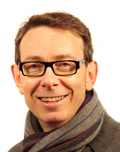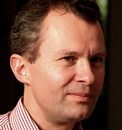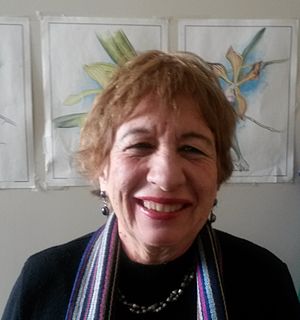
The Oxford Internet Institute (OII) is a multi-disciplinary department of social and computer science dedicated to the study of information, communication, and technology, and is part of the Social Sciences Division of the University of Oxford, England. It is housed over three sites on St Giles in Oxford, including a primary site at 1 St Giles, owned by Balliol College. The department undertakes research and teaching devoted to understanding life online, with the aim of shaping Internet research, policy, and practice.
Gordon Marshall CBE, FBA is a sociologist and Director of the Leverhulme Trust in England.

The European University Institute (EUI) in Florence, Italy, is an international postgraduate and post-doctoral teaching and research institute established by European Union member states to contribute to cultural and scientific development in the social sciences, in a European perspective.

Sir Richard William Blundell CBE FBA is a British economist and econometrician.
Miriam David FRSA FAcSS is a British educator. She is Professor of Education at the Institute of Education, University of London and Associate Director of the Teaching and Learning Research Programme.
The Brooks World Poverty Institute (BWPI) is a research centre at the University of Manchester dedicated to multidisciplinary research on poverty, inequality and growth. It was established in 2005 following the donation of £1.3 million to the university by the Rory and Elizabeth Brooks Foundation, one of the largest known gifts to fund poverty research in Europe. In September 2008, the Foundation awarded a further £1.4 million to the Brooks World Poverty Institute over three years and in June 2012, a further £1 million.

Steve Yearley is a British sociologist. He is Professor of the Sociology of Scientific Knowledge at the University of Edinburgh, a post he has held since 2005. Between 2006 and 2013, he was seconded from the sociology unit to be Director of the ESRC Genomics Policy and Research Forum, more often known as the Genomics Forum. He has been designated a Fellow of the Royal Society of Edinburgh. He is currently Director of the Institute for Advanced Studies in the Humanities.
The Institute for Science and Society (ISS) is an international centre of research excellence in Science and Technology Studies located at the University of Nottingham, UK. Professor Dimitris Papadopoulos is the current director of the Institute.
John Micklewright is Professor Emeritus of Economics and Social Statistics at UCL Institute of Education, University College London.

Christoph Rehmann-Sutter is a Swiss Bioethicist and has been the president of the Swiss National Advisory Commission on Biomedical Ethics for many years. He is professor for Theory and Ethics in the Biosciences at the Institute for the History of Medicine and Science Studies at the University of Lübeck in Germany.
Sue Scott is a British sociologist and feminist whose research has focused primarily on sexuality, gender and risk. She is an Honorary Professor of Sociology and Women's Studies at the University of York, an Honorary Professorial Fellow in Sociology at the University of Edinburgh and a Visiting Professor at the University of Helsinki.
Anne Waldschmidt is a German sociologist. She is a professor at the University of Cologne and teaches disability studies and sociology and politics of rehabilitation. She holds the first university position for disability studies in German-speaking countries.
The Department of Social Policy at the London School of Economics is the UK's oldest and most prestigious academic centre for the study and research of social policy. It hosts and contributes to over ten different research centres including the Centre for the Analysis of Social Exclusion, LSE Health and Social Care and the Mannheim Centre for Criminology. Additionally it is home to the British Society for Population Studies. Notable current faculty members include Paul Dolan, Sir John Hills, Martin Knapp, Julian Le Grand, Elias Mossialos, Eileen Munro, Tim Newburn, David Piachaud and Anne West. Former faculty members include William Beveridge, Richard Titmuss, Peter Townsend and Augustus Nuwagaba.

The Centre For Macroeconomics (CFM) is a research centre in London dedicated to investigation and development of new methodologies and research in order to inform economic policy decisions. It also focuses on ways to alleviate the effects of the global economic crisis through careful study of it. CFM is funded by the Economic and Social Research Council (ESRC), and was founded in 2012

Cristina Possas de Albuquerque is a Brazilian public health scientist working with infectious diseases and emerging infectious diseases from an eco-social perspective. However, her approach to social ecosystem complexity is quite different from the four-fold eco-social approach of Harvard's Nancy Krieger in that she has proposed in a 2001 English-language article in the Brazilian Journal of Public Health Reports the concept of "social ecosystem health" where ecosystems are increasingly changed by social human activity, favoring the emergence of diseases, so the term "social" should precede the prefix "eco". Thus, she is known for (a) developing her new conceptual approach to social epidemiology, incorporating the economic concept of structural heterogeneity into an epidemiological model to identify the epidemiological profiles of heterogeneous populations in different social and economic strata and the conditions for emergence of diseases; (b) contributions of health policy and health reform in Brazil; and research on health transition, ecological change, complex systems, and emergence of new diseases.
BioSocieties is a quarterly peer-reviewed scientific journal covering the scholarly exploration of the crucial social, ethical and policy implications of developments in the life sciences and biomedicine. It was established in 2006 and was originally published by Cambridge University Press on behalf of the London School of Economics and Political Science (LSE). In 2010, the journal was acquired by Palgrave Macmillan, which has published it ever since. The editors-in-chief are Nikolas Rose, Ilina Singh, and Catherine Waldby. According to the Journal Citation Reports, the journal has a 2016 impact factor of 2.162
Jane Cecelia Falkingham is a Professor of Demography and International Social Policy at the University of Southampton. She is also Dean of the Faculty of Social Science at the University of Southampton, and Director of the ESRC Centre for Population Change. In 2018 she was elected President of the European Association of Population Studies (EAPS).. She was President of the British Society for Population Studies between 2015 and 2017.










